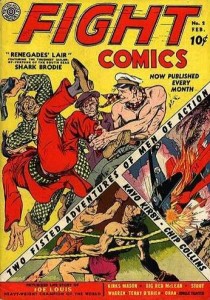Progressive Copyright: Aftermath – The Non-Fight
I just got a bizarre anonymous e-mail from someone who was (I think) interpreting yesterdays “Dead Things on Sticks” as if it was some kind of coded sub-textual-calling-out of everything I wrote on copyright last week.
Firstly, I’m entirely certain if Denis had issue with something I wrote he’d pretty much just say so without the need to concoct elaborate ruses. The man is a highly-skilled writer. Brevity, clarity, imagination and direct communication keep bread on his table. I am a producer, so bombast, wild speculation, and an unwavering belief in Platonic ideals are my stock in trade (the relative popularity of our blogs now starts to make sense).
Secondly, not only is Denis’ post not some “fatal” counter-argument to my posts, I actually agree with most of it.
I think the confusion stems from the fact that I am in favour of shorter copyright terms – which my e-mail author took as blanket support for the “fair copyright / copyfight” movement that Denis was taking issue with. While it’s true I’d like shorter default terms, I also posted that I have no issue with an indefinite copyright – as long as some regular action is required by the copyright holders after a period of time. I don’t even really care about the “fee” system. Make the renewal hitting a button on a website, or sending a post-card to the Library of Canada. I really don’t honestly care if Disney wants to keep Mickey Mouse out of the public domain forever – I care about the vastly larger library of abandoned work which is swept up in gradually increasing terms. Any of my arguments along this line strictly stem from a belief that if a copyright interest had to be actively protected after a period of time (like a trademark interest) no matter how nominally – that would allow almost 100% of creative works to enter the public domain sooner. That rare, profitable, exception? Stay under copyright forever, for all I care.
By the same token my belief in the importance of end-user format shifting doesn’t come from some grand notion that “information wants to be free” it comes from sheer terror of a possible future where there are eight layers of distribution gatekeeper between me and every delivery platform, each wanting a cut out of decreasing revenues.
Improving creator access to works of questionable copyright (or protecting parody or satire)? That’s not because of blind faith that some kind of sustainable free-content delivery model will be found… we just need to look harder – it comes from the fact that in certain situations content creators could have their ability to create strengthened in ways that wouldn’t change any other creators profitability – in whatever distribution model they wish.
None of this is to say that I disagree with some of the tenants of the “fair copyright” movement. Audiences are changing radically. Delivery mechanisms are changing radically. Creative media of all stripes has been very bad at figuring out what this means (because for the most part we want to be creating creative works, and we already do enough stuff in the day that is “not creating creative works”). But as Denis points out – the existing system still allows (some) of us to eat. The proposed system does not. It “may”, but that’s not a terribly compelling argument given the state of my credit card balance.
One last point where, I suspect, Denis and I agree completely is that this argument (while valuable, and nice to engage in) is mostly moot as the most likely bill will essentially be a coat of paint to address distributor interests and ignore both creator and audience issues in their entirely so everyone can go home unhappy.



